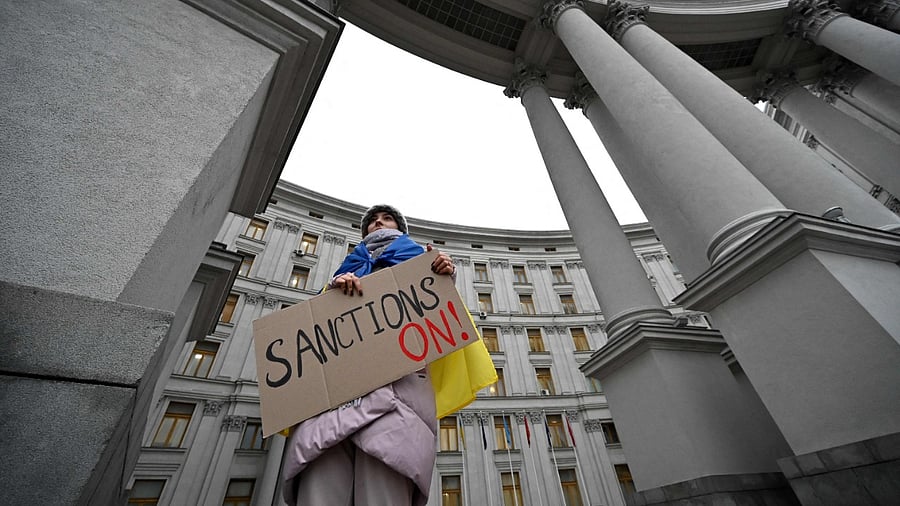
On February 24, the United Kingdom (UK) announced its "largest-ever" economic sanctions on Russia, and so did the United States (US). As the sanctions get stricter, shared economic interests and geopolitical considerations are likely to deepen economic relations between Beijing and Moscow, including the prospect of building an alternative financial system.
The signs of deepening Russia-China economic relations are evident. In an interview with a Russian newspaper amidst Russia's recognition of rebel-held regions in Eastern Ukraine, China's ambassador to Russia, Zhang Hanhui, spoke about possibilities of furthering cooperation between Moscow and Beijing, especially in energy, space, financial cooperation, and high-tech weapons systems. These are also the sectors targeted in the recent round of sanctions by the UK and the US. This is explicit signalling by Beijing of its support for Moscow.
Stricter financial sanctions were expected after Russia marched into Ukraine and started bombing Ukrainian cities. British Prime Minister Boris Johnson has also made a bid to push Russia out of the SWIFT international payment system widely used by banks all over the world. Such sanctions were also speculated during the 2014 Crimean crisis. If America and Europe agree to cut Russia out of SWIFT, it could seriously damage Moscow's international trading capabilities. Exclusion from the global financial system could compel Russia and China to build an alternative financial system to the Brussels-based SWIFT payments system. Iran was once cut off from the SWIFT system. However, Russia will be the first major country to be cut off.
Foreshadowing the possibility of stricter economic sanctions, Russia has already started building its alternative payment system called SPFS. Similarly, in 2015 China also launched its own version of payments systems called Cross-Border Interbank Payment System (CIPS) to internationalise the use of Yuan. Both countries are also exploring options to adopt these alternative models in their respective banking systems.
Although both systems are in the nascent stage of development and not as widely accepted as SWIFT, it indicates Moscow and Beijing's recognition of the need to come together amidst the threat of exclusion from the international financial system. Beijing's efforts to promote digital Yuan (e-CNY) are also supposed to bolster its ability to facilitate cross-border payments. Already being tested in around ten regions of China, the testing of e-CNY was also launched for foreigners during the Beijing Winter Olympics.
SWIFT, Society for Worldwide Interbank Financial Telecommunication, is an international financial service that enables international financial transactions through a network of banks. Founded in 1973, it has become a standard in international finance to use SWIFT messaging service for international transactions. Interestingly, SWIFT was founded out of fear that one American financial institution may dominate and control the global flow of crucial financial information. And now it has become an instrument of foreign policy, even though a Belgium-based global-cooperative society manages it.
In his interview with Russian media, Zhang Hanhui said that China was pleased to see that the Russian government has expanded "purchase of financial products denominated in renminbi (RMB), and investment in reserve currency" among other uses of RMB. He highlighted this as an indicator of positive progress in promoting the diversification of bilateral trade settlement between the two countries. According to numbers quoted by Zhang in the same interview, 17.5 per cent of trade between China and Russia was settled in Yuan in 2020. This is a significant increase since 2014, which recorded trade in Yuan at 3.1 per cent.
Notably, Russia's third-largest oil and gas producer, Gazprom Neft, switched to renminbi for settlement of fuelling Russian planes in China. It is the first Russian company to switch to renminbi-based settlement.
Private companies in China are also working together with Russian companies to build a digital payments system. For example, AliPay, a subsidiary of Alibaba, has teamed up with Russian internet giant VK (formerly known as Mail.ru) to offer digital payment services to Russian users. In 2019, "Yandex.Checkout" became the first online retailer in Russia to accept WeChat Pay. It is a joint venture of Sberbank, Russia's largest bank, and Yandex.
Move to build an alternative international payments system similar to SWIFT would be rooted in realism. Both countries have emerged as rivals of the West in Europe and the Indo-Pacific, respectively. Both countries have faced numerous sanctions over the last few years. Both countries know sanctions may only get stricter over time. Thus, it is prudent and won't be unexpected if Beijing and Moscow stick together despite differences in their worldview. Moreover, despite an imbalance in Russia and China's economic relationship already, Moscow has very few options but to strengthen its relations with China.
This might be Beijing's moment to shine as Russia's trusted partner.
(Megha Pardhi is Research Analyst st the China Studies Program at The Takshashila Institution.)
Disclaimer: The views expressed above are the author's own. They do not necessarily reflect the views of DH.
Watch the latest DH Videos here: